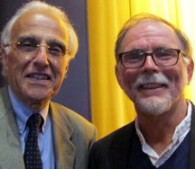I recently received a comment on my earlier post, “Are Muslims a Threat to Us?”
I posted my reply on that page, but want to publish it here, too:
Thanks for responding, Fr. Romansky. After some positive responses to “Are Muslims a Threat to Us?”, I am not surprised by your challenge. First I have to confess that I haven’t heard the word “hebetudinous” in a long time, and had to look it up to make sure it means “dull,” “lazy-minded.”
As for the carnage you note, yes, it is horrifying. I have no words to describe the cruelty of ISIS, Boko Haram, and other violent criminals who identify themselves as Muslim.
We differ on what you call my “friends the Muslims.” All my Muslim friends are horrified by the atrocities you describe. So our difference may be that I refuse to refer to “Muslims” as a single group, just as I refuse to do so with Christians, Jews, and Buddhists. I prefer to say that “people” commit these crimes.
You cite statistics on the number of Christians killed by Muslims. In a more recent post, I note that after the Charlie Hebdo Paris shootings and the outrage they provoked, Rabbi Michael Lerner wonders why “there wasn’t an equal outrage [in the West] at the tens of thousands of innocent civilians killed by the American intervention in Iraq or the over a million civilians killed by the U.S. in Vietnam, or why President Obama refused to bring to justice the CIA torturers of mostly Muslim prisoners, thereby de facto giving future torturers the message that they need not even be sorry for their deeds (indeed, former Vice President Cheney boldly asserted he would order that kind of torture again without thinking twice)?” I wonder, too.
If my thinking is “hebetudinous,” then at least I share that dullness with company I respect. For example, Catholic scholar John Esposito, who finds that “The religion of Islam and the vast moderate majority of Muslims have often been overshadowed or brush-stroked by the acts of a very small group, representing a fraction of 1 percent, a radical minority who assassinate, kidnap, and bomb in the name of God.” Or Muslim-American journalist Abdallah Schleifer, who participated in a Catholic-Muslim conference at the Vatican last fall. The delegates “unanimously condemned acts of terrorism, oppression, violence against innocent persons, persecution, desecration of sacred places and the destruction of cultural heritage… It is never acceptable to use religion to justify such acts or to conflate such acts with religion.” And as long as I’m namedropping, I’ll repeat that Karen Armstrong “doesn’t claim that religion is blameless, but that ‘it has never been the sole nor even the chief cause of either state or terrorist violence.’”
These experienced and thoughtful writers agree that “Muslim” is not a monolithic term. The Muslim world is split. Can we agree to that? For me, the tragedy is that a tiny minority has such disproportionate and destructive power.
Finally, healing and peacemaking are core principles of the Gospel. I understand it to be “good news to the poor,” whether Christian, Muslim, Hindu or atheist. I also believe that the rejection of scapegoating is at the core of the Gospel. If I understand René Girard correctly, he claims that scapegoating—the violent rejection of evil from the community by transferring its sins to a sacrificial victim—died with Christ on the cross. Some rabbis claim that a mature understanding of Genesis is not that God destroyed the “evil” Egyptians, but that God revealed the sins of slavery, arrogance, or violence itself. All religions exclude something. I believe that mature, contemplative traditions exclude the notion of imputing evil to a race or religion. Rather, they seek the grace of self-purification and exclude the use of violence itself in advancing their vision. The more certain they become of the Truth, the less they use it to reject and condemn others. They condemn violence perpetrated in the name of God and try to embrace the ineradicable image of God that lives in everyone.
I believe the waters of baptism strengthen us by melting what has frozen in us and making flexible what has stiffened. I don’t believe I include and respect the Muslim “other” because my faith is weak or because I turn a blind eye to our differences, but because I am being riven and, I hope, raised by grace.
I just can’t seem to shake this nonsense.


No comments:
Post a Comment